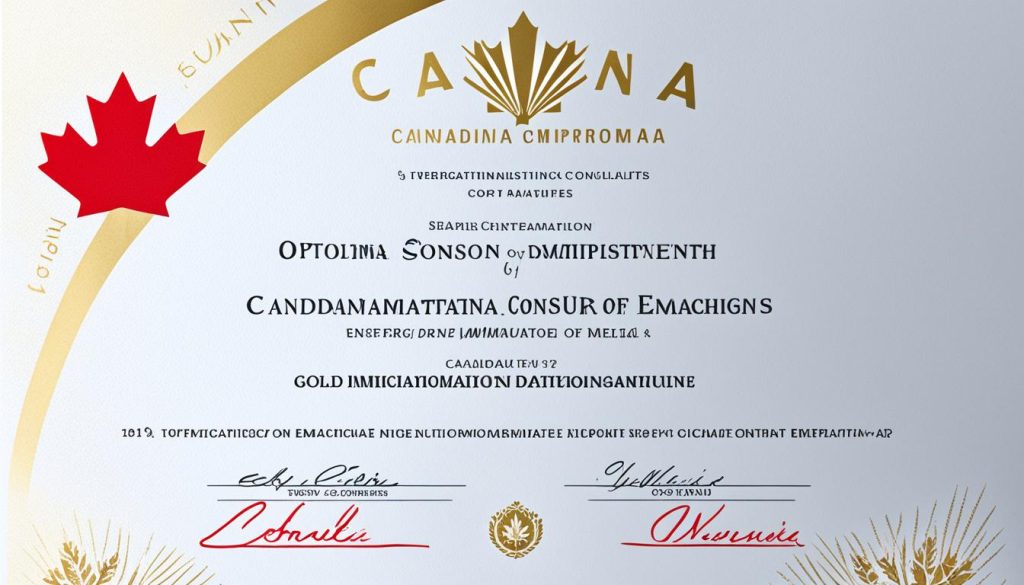Are you looking for a rewarding career in immigration consulting? Do you have a passion for helping others navigate the complexities of immigration processes and policies? If so, then becoming an immigration consultant in Canada may be the perfect choice for you. With a growing demand for professional immigration services, there has never been a better time to enter this field.
In this blog post, we will explore how to become an immigration consultant in Canada and provide you with the essential steps and skills required to embark on this exciting career path. Whether you are a recent graduate looking to start your career or a professional seeking a career change, here are the key steps to get started on your journey to becoming an immigration consultant in Canada.
Introduction to Becoming an Immigration Consultant in Canada
Immigration is a crucial part of Canadian culture and industry, with millions of people from around the world hoping to come to Canada every year. To navigate the complex immigration system, many individuals turn to immigration consultants for assistance. The Government of Canada has strengthened the regulation of immigration consultants through the establishment of the new College of Immigration and Citizenship Consultants, the official regulator of the how to become immigration consultant in canada profession.
Becoming an iccrc regulated canadian immigration consultants in Canada involves meeting specific educational and training requirements. Aspiring consultants must complete a recognized Graduate Diploma program, such as the one offered by Queen’s University Faculty of Law, which provides comprehensive instruction in Canadian immigration law and procedures. Additionally, they must demonstrate proficiency in English or French through language proficiency tests.
Once the educational and language requirements are fulfilled, prospective consultants must pass the iccrc full skills exam, a rigorous entry-to-practice exam administered by the College of Immigration and Citizenship Consultants. This exam assesses the candidate’s knowledge and skills in various areas of immigration consulting, ensuring they are prepared to provide high-quality services to their clients.
After successfully passing the exam and meeting all other licensing requirements, individuals can officially become Regulated Canadian Immigration Consultants (RCICs), authorized to assist clients with study, work, and citizenship applications in Canada. These professionals play a vital role in helping immigrants navigate the Canadian immigration system and achieve their goals.
| Consultant | Experience | Specialization |
|---|---|---|
| Sabine Hassoun | 15+ years | General Immigration |
| Colin Singer, LL.B, BA | 30+ years | Economic Class Immigration |
| Melissa Godmer, BBA, RCIC | 7 years | Business Immigration |
| Eivy Joy Quito, RCIC | 9 years | All areas except Refugee and Asylum |
| Andra Dumitrescu, Hons BA, JD, LLM | 5 years | Immigration Law |
| Grace Daccache, MA, CCIC | 16 years | Economic, Temporary, and Family Immigration |
| Oussama Mahmoud, BA, CCIC | 6.5 years | Economic, Family, and Temporary Immigration |
The demand for immigration services in Canada is expected to continue growing, with the country projected to welcome nearly a million more foreign-born individuals in the next three years. The how to become immigration consultant in canada profession offers diverse career opportunities, and the Graduate Diploma program at Queen’s University is poised to play a crucial role in training the next generation of Regulated Canadian Immigration Consultants.

Education and Training Requirements for Immigration Consultants
To become a Regulated Canadian Immigration Consultant (RCIC), aspiring professionals must complete a graduate-level diploma program and demonstrate language proficiency. These educational and training requirements ensure that immigration consultants possess the necessary knowledge and skills to provide expert guidance to individuals and families navigating the complex Canadian immigration system.
1. Graduate Diploma Programs
The primary pathway to becoming an RCIC involves completing a Graduate Diploma in Immigration and Citizenship Law, such as the program offered by Queen’s University or the D.E.S.S. en réglementation canadienne et québécoise de l’immigration at the University of Montréal. These specialized programs equip students with a comprehensive understanding of immigration laws, policies, and best practices, preparing them for successful careers as canadian immigration consultant certification.
The Queen’s University Graduate Diploma in Immigration and Citizenship Law, for example, costs approximately $14,000 in total tuition fees and covers a range of topics, including the immigration consultant training programs, the Immigration and Refugee Protection Act, and the unique considerations for Quebec immigration. Preference is given to applicants with the best qualifications, and a non-refundable $400 deposit is required to secure enrollment.
2. Language Proficiency Tests
In addition to completing a graduate diploma program, all candidates seeking the immigration consultant courses canada, except for graduates from the Queen’s University and University of Montréal programs, must demonstrate proficiency in either English or French. This is achieved by attaining at least the minimum required score on a College-approved language ability test, such as the IELTS, CELPIP, or TEF.
The iccrc full skills exam is a critical step in the journey to becoming an RCIC. Administered by the Immigration Consultants of Canada Regulatory Council (ICCRC), the exam consists of approximately 140 multiple-choice questions and takes three hours to complete. Successful candidates are then eligible to apply for RCIC registration and begin their professional practice.

Entry-to-Practice Exam (EPE) for Immigration Consultants
After completing the required education and training, aspiring immigration consultants must successfully pass the College’s Entry-to-Practice Exam (RCIC EPE) to become a Regulated Canadian Immigration Consultant (RCIC). The EPE assesses the candidate’s knowledge and competencies in various areas of immigration and citizenship law and procedures.
To be eligible for the EPE, candidates must be at least 18 years of age and provide acceptable government-issued photo identification. They must also demonstrate language proficiency, achieving at least Canadian Language Benchmark (CLB) Level 9 for English or Niveau de compétence linguistique Canadien (NCLC) Level 9 for French. Acceptable language tests include IELTS – Academic, CanTEST, CELPIP, CAEL for English, and TEF, TEF Canada, TCF – Canada for French, with scores obtained no more than 2 years prior.
The EPE consists of 135 multiple-choice questions that candidates must answer within a three-hour period. The exam covers nine competencies, including Foundational Knowledge, Case Management, Legal Research and Informatics, Business Management and Leadership, IRB and Administrative Tribunals, Professionalism, Cultural Competence, Communication, Counselling, and Advocacy, Critical Thinking, Problem Solving, and Evidence-Based Practice.
The EPE is held four times a year, in March, June, September, and December. Candidates can defer their exam by paying a $75 fee, as long as they request the deferral at least two days before the exam date. The application fee for the EPE is $75, and the exam fee for first-time writers is $425.
Candidates who fail the EPE can re-write the exam up to four times within three years of their graduation from the training program, with a subsequent exam application fee of $325. The ICCRC provides a breakdown of topics that candidates performed poorly on to help them focus on areas needing improvement.
| Exam Details | Requirements |
|---|---|
| Age Requirement | 18 years or older |
| Language Proficiency | CLB Level 9 for English or NCLC Level 9 for French |
| Exam Structure | 135 multiple-choice questions, 3-hour duration |
| Exam Frequency | 4 times per year (March, June, September, December) |
| Exam Fees | Application fee: $75, Exam fee (first-time): $425 |
| Exam Deferral | $75 fee, request at least 2 days before exam date |
| Exam Retakes | Up to 4 times within 3 years of graduation, $325 fee |
Passing the iccrc full skills exam is a crucial step for aspiring iccrc members on their journey to becoming a Regulated Canadian Immigration Consultant (RCIC). The iccrc entry-to-practice course lays the foundation, and the EPE assesses the candidate’s readiness to provide professional immigration services in Canada.

How to Become an Immigration Consultant in Canada?
Becoming a Regulated Canadian Immigration Consultant (RCIC) involves a comprehensive process to obtain the necessary license from the College of Immigration and Citizenship Consultants (CICC). This process ensures that individuals seeking to provide immigration and citizenship consulting services in Canada meet the rigorous educational, training, and professional standards required by the regulatory body.
1. College Licensing Process
The first step towards becoming an RCIC is to complete the required education and training program. This typically involves obtaining a graduate diploma from an accredited institution, which covers topics such as Canadian immigration and citizenship laws, policies, and procedures. Upon completion of the educational requirements, aspiring consultants must pass the Entry-to-Practice Exam (EPE) administered by the CICC.
Once the EPE is successfully passed, individuals can apply for a license from the CICC. This process includes submitting a comprehensive application, providing necessary documentation, and paying the required fees. The CICC then reviews the application and, if approved, grants the individual the RCIC designation, allowing them to legally practice as an immigration consultant in Canada.
2. Ongoing Education and Mentorship
Becoming an RCIC is not the end of the journey; it is the beginning of a lifelong commitment to professional development and continuous learning. RCICs must maintain their knowledge and expertise by participating in ongoing education programs, such as workshops, seminars, and webinars, to stay up-to-date with the latest changes in immigration and citizenship laws and policies.
Additionally, the CICC requires RCICs to participate in a Mentoring Program, where experienced consultants provide guidance and support to newer members of the profession. This mentorship helps to ensure that RCICs adhere to the highest standards of ethical and professional conduct, ultimately benefiting the clients they serve.

The path to becoming an RCIC in Canada is both rigorous and rewarding. By completing the necessary education, passing the EPE, and adhering to the CICC’s ongoing professional development requirements, individuals can establish themselves as trusted and iccrc regulated canadian immigration consultants, providing invaluable services to those navigating the complex world of Canadian immigration.
Role and Responsibilities of a Regulated Canadian Immigration Consultant
Regulated Canadian Immigration Consultants (RCICs) play a pivotal role in assisting individuals and businesses navigate the intricate Canadian immigration system. As professionals who have undergone extensive training and accreditation, RCICs are responsible for providing ethical and expert advice, preparing and submitting immigration applications, and representing clients before Immigration, Refugees and Citizenship Canada (IRCC).
RCICs must adhere to a strict code of professional conduct and ethical standards set by the College of Immigration and Citizenship Consultants (CICC), the regulatory body that oversees the practice of immigration consulting in Canada. This ensures that iccrc regulated canadian immigration consultants deliver reliable and trustworthy services to their clients, upholding the integrity of the canadian immigration law and policies.
RCICs are required to complete a graduate diploma program delivered by specific universities or the former Immigration Practitioner Program (IPP) by December 31, 2022. They must also successfully pass the Entry-to-Practice Exam (RCIC EPE) and maintain Professional Liability Insurance annually. Additionally, RCICs are mandated to complete mandatory Practice Management Education (PME) courses and 16 hours of Continuing Professional Development (CPD) every year to stay up-to-date with the latest immigration regulations and best practices.
| Requirement | Details |
|---|---|
| Graduate Diploma Program | RCICs must complete a graduate diploma program delivered by specific universities or the former Immigration Practitioner Program (IPP) by December 31, 2022. |
| Entry-to-Practice Exam (RCIC EPE) | RCICs must successfully pass the Entry-to-Practice Exam (RCIC EPE) to become licensed. |
| Professional Liability Insurance | RCICs are mandated to maintain Professional Liability Insurance annually. |
| Practice Management Education (PME) | RCICs must complete mandatory Practice Management Education (PME) courses. |
| Continuing Professional Development (CPD) | RCICs are required to complete 16 hours of Continuing Professional Development (CPD) every year. |
By adhering to these rigorous requirements, iccrc regulated canadian immigration consultants demonstrate their commitment to providing high-quality services and upholding the highest standards of the canadian immigration law and policies. This ensures that clients can trust in the expertise and professionalism of their immigration consultant throughout the complex immigration process.
Career Prospects and Opportunities for Immigration Consultants
1. Demand for Immigration Services
The demand for immigration consultant services in Canada remains high, as the country continues to welcome a large number of immigrants and temporary residents each year. Regulated Canadian Immigration Consultants (RCICs) can find employment opportunities in various settings, such as private immigration consulting firms, law firms, and government agencies. The career prospects for RCICs are promising, as the regulation of the profession is expected to enhance the integrity and professionalism of the industry, leading to increased trust and demand for their services.
According to labour market data, employment in the field of immigration consulting reached 108,600 in 2021. The job outlook for social policy researchers, consultants, and program officers, which includes immigration consultants, is expected to be moderate over the next 10 years, with an anticipated 52,700 new job openings and 48,900 job seekers during this period.
The highest number of employment opportunities for immigration consultants may be found in public administration and professional, scientific, and technical services companies, such as legal and immigration consultancy firms. RCICs can set their own fees for their services, ensuring fair and reasonable pricing for clients. However, Regulated International Student Immigration Advisors (RISIAs) are not allowed to collect fees directly from students, as they are paid employees of specific Designated Learning Institutions (DLIs).
To maintain their professional standing, RCICs are required to complete specific educational programs, such as the graduate diploma program by Queen’s University or the Université de Montréal, and engage in ongoing professional development, including 16 hours of training annually. Similarly, RISIAs must complete the International Students and Immigration Education Program (ISIEP) and engage in at least 6 hours of professional development each year to maintain good standing with the College.
| Key Statistic | Value |
|---|---|
| Employment in the field of immigration consulting in 2021 | 108,600 |
| Expected new job openings for Social policy researchers, consultants, and program officers & Health policy researchers, consultants, and program officers over the period 2022-2031 | 52,700 |
| Expected new job seekers for Social policy researchers, consultants, and program officers & Health policy researchers, consultants, and program officers over the period 2022-2031 | 48,900 |
| Employment outlook for social policy researchers, consultants, and program officers in Ontario for the period 2023-2025 | Moderate |
| Percentage of self-employed social policy researchers, consultants, and program officers | 10% |
| Gender distribution: Men vs. Women | 34% vs. 66% |
| Educational attainment: Bachelor’s degree vs. University certificate, degree, or diploma above bachelor level | 39% vs. 43% |
| Distribution of full-time and part-time workers | 92% full-time, 8% part-time |
| Job prospects rating for Social policy researchers, consultants, and program officers in Canada | 3 out of 5 stars (moderate) |
Conclusion
Becoming an immigration consultant in Canada is a rewarding and impactful career path. By completing the necessary education, training, and licensing requirements, individuals can embark on a journey of helping people from around the world fulfil their dreams of immigrating to Canada. The process of becoming a Regulated Canadian Immigration Consultant (RCIC) involves a comprehensive understanding of Canada’s immigration and citizenship laws, as well as the expertise to navigate the complex application process.
Aspiring immigration consultants must acquire a graduate diploma from an accredited program, demonstrate proficiency in English and/or French, and pass the Entry-to-Practice Exam. Once licensed by the College of Immigration and Citizenship Consultants, they can assist clients in assessing their eligibility, preparing application forms, compiling required documents, and preparing for language tests and interviews. With their knowledge and experience, RCICs can increase the chances of successful immigration applications, making them invaluable assets to individuals and families seeking to build a new life in Canada.
The demand for immigration services in Canada remains high, as thousands of people from around the world aspire to become permanent residents each year. By becoming a how to become immigration consultant in canada, professionals can play a crucial role in helping these individuals achieve their goals, while also building a rewarding and fulfilling career in the field of canadian immigration consultant certification.
FAQ
1. What are the requirements to become an immigration consultant in Canada?
To become a Regulated Canadian Immigration Consultant (RCIC), you must be at least 18 years of age, complete a Graduate Diploma Program or the former Immigration Practitioner Program, achieve a minimum required score on a College-approved language test, and successfully pass the College’s Entry-to-Practice Exam (RCIC EPE).
2. What is the role of the College of Immigration and Citizenship Consultants (CICC)?
The College of Immigration and Citizenship Consultants (CICC) is the official regulator of immigration and citizenship consultants in Canada, and all paid consultants must be licensed by the College to work with Immigration, Refugees and Citizenship Canada.
3. What are the educational and training requirements for becoming an immigration consultant in Canada?
To become a Regulated Canadian Immigration Consultant (RCIC), you must complete a Graduate Diploma Program, such as the Queen’s University Graduate Diploma in Immigration and Citizenship Law or the D.E.S.S. en réglementation canadienne et québécoise de l’immigration offered by the University of Montréal. Additionally, all candidates, except for graduates from the Queen’s University and University of Montréal graduate diploma programs, must achieve at least the minimum required score on a College-approved English or French language ability test.
4. What is the Entry-to-Practice Exam (EPE) for immigration consultants in Canada?
After completing the required education and training, aspiring immigration consultants must successfully pass the College’s Entry-to-Practice Exam (RCIC EPE) to become a Regulated Canadian Immigration Consultant (RCIC). The EPE assesses the candidate’s knowledge and competencies in various areas of immigration and citizenship law and procedures.
5. What is the process to become a Regulated Canadian Immigration Consultant (RCIC)?
The process to become a Regulated Canadian Immigration Consultant (RCIC) involves obtaining a licence from the College of Immigration and Citizenship Consultants (CICC). This includes completing the required education and training, passing the Entry-to-Practice Exam, and following the College’s licensing process. Once licensed, RCICs must also meet ongoing education requirements and participate in the College’s Mentoring Program to maintain their professional standards and stay up-to-date with changes in immigration and citizenship law and policies.
6. What are the responsibilities of a Regulated Canadian Immigration Consultant (RCIC)?
Regulated Canadian Immigration Consultants (RCICs) are responsible for providing professional and ethical advice, preparing and submitting immigration applications, and representing clients before Immigration, Refugees and Citizenship Canada. They must adhere to a strict code of professional conduct and ethical standards set by the College of Immigration and Citizenship Consultants.
7. What are the career prospects for immigration consultants in Canada?
The demand for immigration services in Canada remains high, as the country continues to welcome a large number of immigrants and temporary residents each year. Regulated Canadian Immigration Consultants (RCICs) can find employment opportunities in various settings, such as private immigration consulting firms, law firms, and government agencies. The career prospects for RCICs are promising, as the regulation of the profession is expected to enhance the integrity and professionalism of the industry, leading to increased trust and demand for their services.




